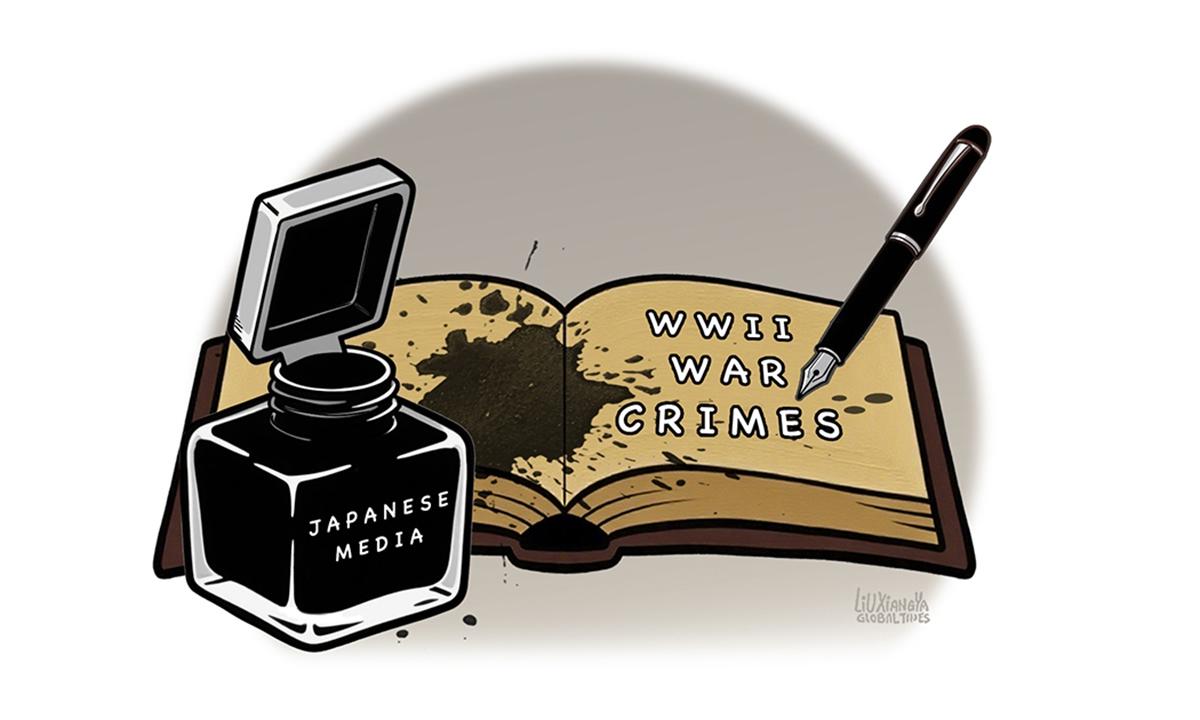
Illustration: Liu Xiangya/GT
The Nanjing Massacre, which lasted for more than 40 days following the Japanese troops' capture of Nanjing, the then Chinese capital, on December 13, 1937, left more than 300,000 Chinese civilians and unarmed soldiers in Nanjing dead and 20,000 women raped, according to Xinhua. The truth about this dark chapter of history has been well documented and undeniable.
However, as China is set to hold a grand gathering on September 3 to mark the 80th anniversary of the victory in the Chinese People's War of Resistance against Japanese Aggression and the World Anti-Fascist War, there are some shocking rhetoric emerging from some some media outlets in Japan, the aggressor and defeated party in the wars.
In an article published on Monday, Takashi Arimoto, deputy managing editor of the Japanese newspaper Sankei Shimbun, took aim at the Chinese film Dead to Rights, which tells a war story about the Nanjing Massacre, and asserted that the Nanjing Massacre is "a historical hoax devised by China."
Such astonishing and outrageous claims, characterized by Japan's long-held historical denialism mentality, are attempts to overturn established international consensus through deliberate misinterpretation of historical records. Since the film Dead to Rights was released both in China and overseas, it has resonated with audiences worldwide. While it takes them back to one of the darkest chapters of the wars, it opens a door for them to learn about the atrocities. What drives certain Japanese right-wing forces to smear the Chinese film? The only answer is: the fear of the truth getting spread.
The truth about the Nanjing Massacre is supported by overwhelming evidence from multiple sources. To just name a few: Minnie Vautrin, an American Christian missionary known for caring for and protecting at least 10,000 Chinese refugees, and John Rabe, a German diplomat and businessman known for his efforts to stop Japanese war crimes and protect Chinese civilians during the Nanjing Massacre, both documented Japanese atrocities in their diaries. Above all, the scars and nightmares endured by survivors of the Nanjing Massacre stand as enduring evidence of this living history.
The Japanese media hawk used the term "historical hoax," as light and shallow as it is, in an attempt to distort a history of blood and sorrow. What's even troubling is that nowadays, there is an apparent lack of understanding of history among the Japanese public. A review of various versions of textbooks in Japan by Global Times reporters during a recent trip shows that a vast majority of them avoid using the word "massacre" and ambiguously talk about the number of deaths.
Chen Youjun, a professor from the East-Asia Research Center of Shanghai University, told the Global Times that right-wing forces in Japan still hold an illusionary collective memory of what they consider to be a strong Japan during WWII, and historical denialism has led some Japanese to fail to establish a correct understanding of history and values.
The film Dead to Rights has been met with vicious attacks from certain Japanese right-wing groups since its release, only because it depicts a dark chapter of history that challenges their twisted historical view. A country that cannot reconcile with its past will never truly win the trust of others. If Japan cannot squarely face and reflect on its history of aggression with an honest attitude, it will never earn the trust of its Asian neighbors and the international community.
China's commemorations for the Nanjing Massacre as well as the victory against Japanese aggression is about truth and reflection. China is fulfilling its duty, as a responsible major power, to uphold a correct historical perspective. Through these events, it is telling its own citizens, as well as the world, what happened, and why and how we should not let it happen again.



